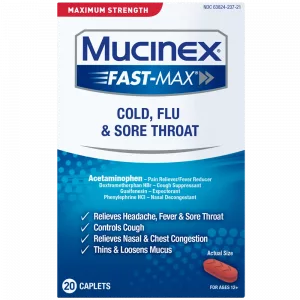A dry cough can arise from many sources, including allergies and viral infections. Home treatments and medications often bring relief. Keeping well hydrated and steering clear of allergens or airborne irritants can also help alleviate symptoms.

Coughing is a reflex that clears your airways of irritants and mucus.
Coughs are broadly classified into two types: productive and nonproductive. A productive cough expels phlegm or mucus, helping clear the lungs. A nonproductive cough, commonly called a dry cough, produces little to no mucus.
Numerous factors — from allergic reactions to acid reflux — can trigger a dry cough. Sometimes, no clear cause is identified.
A persistent dry cough can significantly disrupt daily life, particularly when it interferes with sleep. Continue reading to discover potential triggers of a dry cough and strategies to find relief.
Common causes
Frequent causes of a dry cough include:
Asthma
Asthma involves inflammation and narrowing of the airways. Asthma-related coughs can be productive or dry, though they are often nonproductive. Coughing is a common asthma symptom, although it’s not always the predominant one. Some individuals have a form known as cough-variant asthma.
Learn more about asthma signs and treatment options.
Gastroesophageal reflux disease
Gastroesophageal reflux disease (GERD) is a chronic form of acid reflux. It occurs when stomach acid frequently flows back into the esophagus, the tube connecting your mouth and stomach.
Stomach acid can irritate the esophagus and provoke the cough reflex. Find out more about GERD symptoms and treatment approaches.
Postnasal drip
Postnasal drip describes excess mucus running down the back of the throat.
When you have a cold or seasonal allergies, the lining of your nose produces more mucus than normal. This mucus tends to be thinner and runnier, allowing it to drain down the throat. Postnasal drip can tickle nerves at the back of the throat, setting off a cough.
Treatment for postnasal drip depends on its cause, but steam from a hot shower or teapot can help clear nasal passages. A saline spray or neti pot can also flush out surplus mucus.
Viral infection
When infected with one of the many viruses that cause the common cold, short-term symptoms typically resolve within a week. However, a cough may persist long after other symptoms have improved.
These post-viral coughs are often dry and may continue for up to two months. They usually result from heightened sensitivity and irritation in the airway following a viral illness.
Upper respiratory infection
An acute upper respiratory infection (URI) is caused by viruses or bacteria that affect the nose, throat, pharynx, larynx, and bronchi. The common cold is an example of a URI.
Other URIs include sinusitis and pharyngitis.
Learn more about treatments used for URIs.
Allergies
When the immune system misidentifies an innocuous substance like pollen as harmful, it mounts a response. This reaction can produce symptoms such as coughing.
Seasonal allergies, also called hay fever or allergic rhinitis, are triggered by plant pollen. These allergies are common, affecting many people in the United States.
Apart from coughing, symptoms can include itchy or watery eyes and a runny nose. Consult a doctor if over-the-counter remedies aren’t easing your symptoms.
Less common causes
Less frequent sources of a dry cough include:
- ACE inhibitor medications
- whooping cough (pertussis)
- collapsed lung (pneumothorax)
- lung cancer
- heart failure
- idiopathic pulmonary fibrosis (IPF)
Treatment and home remedies for dry cough
Dry coughs can be challenging to manage. Once airways become overly reactive, they’re easily set off by coughing, creating a self-perpetuating cycle.
Treatment commonly includes decongestants, cough suppressants, and expectorants. If over-the-counter options don’t relieve your cough, a physician may prescribe medications tailored to the underlying cause.
For instance, they might recommend:
- an oral antihistamine for allergy-related cough
- inhaled corticosteroids for asthma
- antibiotics if a bacterial infection is present
- acid-suppressing medications for reflux
You might also try home measures and natural remedies such as:
- running a humidifier to increase indoor moisture
- drinking warm beverages
- taking a spoonful of honey at the onset of coughing
- gargling with salt water
Not every remedy is safe for everyone. For example, honey should never be given to infants under 1 year old. Check with a pharmacist or healthcare provider to ensure a treatment is appropriate.
When to see a doctor
A dry cough is seldom a sign of something serious. In most cases, dry cough symptoms resolve without medical intervention within about three weeks. If your cough persists beyond this period and home measures haven’t helped, consult a doctor.
Frequently asked questions
Why do I have a cough that won’t go away, but I’m not sick?
Several conditions can cause a cough in the absence of an active infection. These include gastroesophageal reflux disease (GERD), asthma, allergies, smoking, certain medications like ACE inhibitors, and others.
Rarely, a chronic cough could signal a more serious issue such as lung cancer, heart failure, or a pulmonary embolism (blood clot in the lung).
What does a GERD cough sound like?
People often describe a GERD cough as dry and hacking, without mucus, producing a tickling or scratching sensation in the throat. It may worsen at night or when lying flat.
What type of cough is worrying?
You should seek medical attention if your cough:
- persists longer than three weeks
- interferes with daily activities
- is accompanied by shortness of breath or difficulty breathing
- causes pain
How do you get rid of a dry cough?
Keeping hydrated, using lozenges or cough drops, and taking OTC cough suppressants can help ease a dry cough. Avoiding irritants like smoke and dust is also important.
What is a dry cough a symptom of?
A dry cough can signal the common cold, flu, allergies, asthma, or acid reflux. It may also be a sign of more serious illnesses like pneumonia, so seek medical advice if the cough is persistent.
Why won’t my dry cough go away?
A lingering dry cough can stem from various causes. It’s wise to consult a physician if a cough lasts more than a few weeks.
The bottom line
Dry coughs can be irritating, especially when they linger for weeks. If coughing disrupts your sleep, try strategies to reduce nighttime coughing.
If the cause of your cough is unclear, work with a doctor to determine the best treatment. Meanwhile, combining home remedies with over-the-counter options can help manage discomfort.
If you need assistance locating a primary care provider, explore our FindCare tool here.

























Leave a Reply
You must be logged in to post a comment.